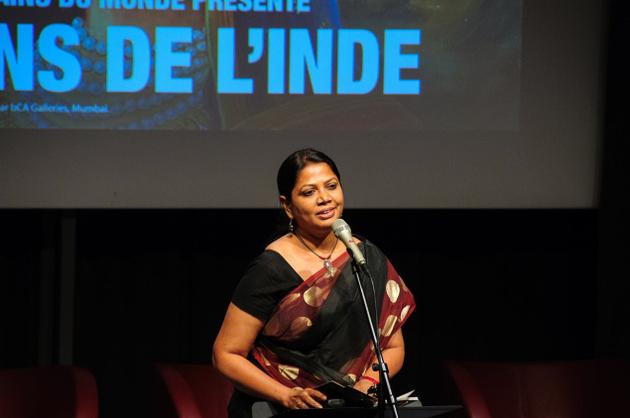
Poet-activist Salma on her experiences at the Writers of India Festival, Paris
On May 26, this year, poet Salma received a letter inviting her to be a guest of honour at the Writers of India Festival, Paris, in September. The festival, a new collaboration between Columbia University, New York, and the Bibliothèque nationale de France, featured a series of lectures and discussions with more than 12 Indian writers at Reid Hall, Columbia and BnF in Paris. Salma talks about her journey as a poet, her experiences in Paris and how poetry can make an impact.
You used to write secretly when you were young as you were confined to the house from the age of 13. Did you ever think at that time that you would be an established writer?
(Laughs) I was very confident my words would reach the world. I still remember this scene vividly. I was 16. I was standing with my sister in the kitchen and she was rolling out chapatis. ‘You had better learn to cook,’ my sister said. Otherwise, people will say we did not bring you up properly. I told my sister — I’m going to be a famous writer. I’ll go to many countries and attend many conferences. I don’t need to learn to cook!
And now, you have just attended the Writers of India festival. How was the experience?
There were several readings and discussions every day and at least five events were happening at the same time. Everything was well organised. They had French translators. I was the only one to have a screening of my film Salma! It was followed by an interview with senior journalist, Judith Oriol — she came prepared with an in-depth questionnaire.
What was the audience reaction to your film, which documents the story of your life?
Many of them got very emotional. It was hard for people to believe that so many women do not have even the basic rights and that it is a struggle.
Is poetry part of our everyday culture?
Thirukkural
What made you write poems, not stories?
Like many girls in a Muslim community, I was not allowed to leave the house in my small town Thuvarankurichi. I had many conflicting feelings and I wanted the freedom to live life, do many things. A poem can be a powerful expression and all my pent-up emotions came through in verse.
Can you read from one of your poems presented at the festival?
A few lines from Naan Illadha Avan Ulagam (His world beyond me). It is about a mother and son.
He, who had asked me
on a night of the moon’s full retreat
if the sun too would be gone someday,
has no more answers to seek from me.
How have your experiences impacted your writing?
It is an unbelievable life, to be a writer. My poems are for everyone, but I especially wanted to reach out to women, and make a difference for them. They must realise their lives. They must understand their identity.
Your family’s resistance to your writing – did that change?
There were many changes that happened over time, but the big shift happened when I entered politics. At that point, my family had no choice but to accept it.
(Salma won a seat reserved for women in Thuvarankurichi in the 2001 panchayat elections and was elected MLA in 2006).
Your writing got acceptance when it was connected with a larger purpose — political and social. Can writing by itself bring about social change?
Writing alone cannot bring change. We need political will to usher in change.
The theme of the festival in Paris was on the impact of globalisation on cultural creation and consumption. Did the festival address these ideas?
I got the chance to be on the same platform as award-winning writers Jeet Thayil, Vikram Chandra and Kiran Desai and there were stimulating exchanges. All participants had to contribute essays on globalisation, which will be published in the form of a booklet.
In India, many do not consider storytelling and poetry real professions. How did you find it in other countries?
People respect writers. A writer receives more adulation than a politician, in some ways. From the time I landed at the airport, people used to ask me to recite a poem in Tamil, just because they wanted to hear how it sounded!
source: http://www.thehindu.com / The Hindu / Home> Books> Author / by Sujatha Shankar Kumar / October 17th, 2014








